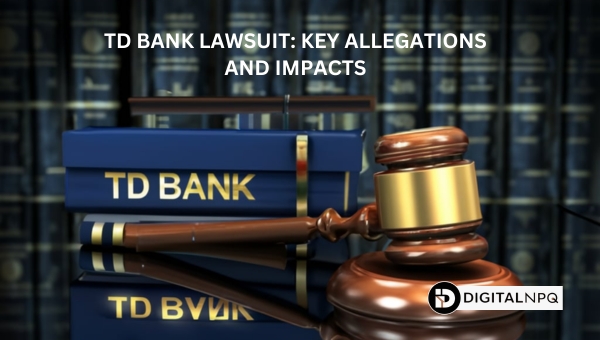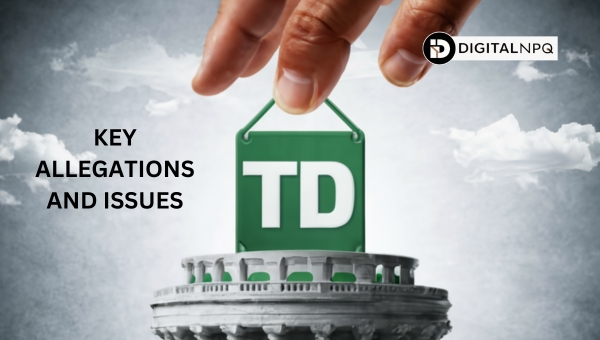TD Bank Lawsuit: Key Allegations and Impacts

If you’re looking to understand the crucial details of the TD Bank lawsuit, you’re in the right place. This article will delve into the key allegations against TD Bank, including anti-money laundering violations and fraud claims.
We’ll also examine the impact on stakeholders, such as customers and shareholders. By the end, you’ll have a comprehensive grasp of the lawsuit’s current status, potential outcomes, and what to expect next. Keep reading to uncover everything you need to know about the TD Bank lawsuit.
A Closer Look at the TD Bank Lawsuit
TD Bank, one of the prominent banks in the United States, is currently entangled in multiple legal challenges. These lawsuits revolve around serious allegations, including trademark infringement, anti-money laundering violations, and improper fees charged to customers.

The legal actions involve both cases filed by TD Bank and against it. Notably, the bank is accused of failing to maintain adequate anti-money laundering controls, which has resulted in significant scrutiny.
Additionally, there are claims concerning the improper management of fees, leading to potential settlements. These lawsuits underscore the critical legal obstacles TD Bank is facing, impacting its operations and reputation.
Key Allegations And Issues
TD Bank is currently embroiled in significant legal challenges. The primary focus revolves around allegations of anti-money laundering violations and claims of fraud and mismanagement. These issues not only question the bank’s internal controls but also raise concerns about its operational transparency.

Anti-Money Laundering Violations
The lawsuit highlights several specific anti-money laundering violations:
- Systemic Deficiencies: The bank allegedly failed to maintain adequate controls to detect and report suspicious activities.
- Regulatory Penalties: Financial penalties have been imposed due to non-compliance with U.S. anti-money laundering regulations.
- Misrepresentation: It is claimed that TD Bank misrepresented the effectiveness of its anti-money laundering program, leading to a decline in stock prices once these deficiencies were disclosed.
Fraud And Mismanagement Claims
Fraud and mismanagement claims within TD Bank are significant:
- Stanford Financial Group Ponzi Scheme: TD Bank agreed to a $1.205 billion settlement in litigation involving this notorious scheme.
- Denial Of Liability: Despite the settlement, TD Bank denies any wrongdoing, opting to settle to avoid further legal complications.
- Historical Allegations: These claims underscore past issues of fraud and mismanagement that have plagued the bank, prompting a closer look at its internal controls and governance.
Also Read: Time Change Spring 2024: Everything You Need to Know
Impact On Stakeholders
The ongoing TD Bank lawsuit has significant implications for various stakeholders. Let’s delve into how these legal challenges are affecting both customers and shareholders.

Customers
The lawsuit has raised several concerns for TD Bank customers:
- Duplicative Fees: Many customers have been affected by allegations of being charged duplicative non-sufficient funds (NSF) fees.
- Settlement Impact: A proposed settlement of $15.9 million is pending court approval, which aims to compensate affected customers.
- Customer Trust: These issues may erode trust in the bank’s ability to manage customer accounts transparently and fairly.
Shareholders
The lawsuit also has important ramifications for shareholders:
- Stock Price Impact: Allegations of anti-money laundering violations have led to a significant drop in TD Bank’s stock price.
- Investment Confidence: Shareholders may lose confidence in the bank’s management and compliance practices.
- Financial Penalties: Potential financial penalties and settlements could impact overall profitability and return on investment.
The outcomes of these legal proceedings will likely shape the future of TD Bank’s relationships with both its customers and shareholders.
Current Status Of The Lawsuit
The TD Bank lawsuit is currently at a critical juncture, with ongoing developments in legal proceedings and potential outcomes. This section will delve into the latest updates and explore what might lie ahead for TD Bank.
Legal Proceedings
Several key legal proceedings are underway in relation to the TD Bank lawsuit. These include:
- Class Action Stage: The anti-money laundering lawsuit is in the proposed class-action stage. Shareholders who purchased TD shares between specified dates are represented.
- Settlement Approval: The lawsuit concerning duplicative NSF fees has reached a proposed settlement, which is awaiting court approval.
- Regulatory Inquiries: Ongoing regulatory inquiries into TD Bank’s compliance practices form a part of the broader legal context.
Potential Outcomes
The potential outcomes of the TD Bank lawsuit could have significant implications for the bank. These include:
- Financial Penalties: If found guilty of anti-money laundering violations, TD Bank could face substantial financial penalties.
- Reputational Impact: The bank’s reputation may suffer, affecting customer trust and market positioning.
- Compliance Reforms: The lawsuits could lead to stricter compliance measures and internal reforms within TD Bank.
- Customer Compensation: The settlement of the NSF fee lawsuit may result in financial compensation for affected customers.
These ongoing proceedings and potential outcomes will shape the future landscape for TD Bank and its stakeholders.
Also Read: IRS Stimulus Check Updates 2024: What You Should Know
Legal Representation And Counsel
When it comes to legal battles, having strong representation is crucial. In the TD Bank lawsuit, both sides have enlisted formidable legal teams to defend their interests. Let’s take a closer look at the class counsel and defense counsel involved.
Class Counsel
The class counsel represents the parties bringing the lawsuit against TD Bank. Their responsibilities include gathering evidence, arguing the case, and seeking compensation for their clients. Key firms involved are:
- Sotos Class Actions: Sotos is representing shareholders in the anti-money laundering lawsuit.
- Koskie Minsky LLP: This firm is handling the class action related to duplicative NSF fees charged to customers.
Defense Counsel
TD Bank has its team of legal experts to counter the allegations. The defense counsel’s job is to challenge the claims, defend the bank’s actions, and minimize any potential penalties. Leading the defense are:
- Internal Legal Team: TD Bank’s in-house legal experts are working closely with external counsel.
- External Law Firms: Specialized law firms have been brought on board to provide additional expertise and support.
What To Expect Next
As the TD Bank lawsuit progresses, there are several key developments and steps to keep an eye on. Here’s what you can expect in the near future:
Upcoming Court Dates or Hearings
One of the immediate next steps involves upcoming court dates or hearings. These will be crucial in determining the course of the lawsuit. It’s important to stay updated on these dates, as they provide critical junctures where new evidence could be presented, and significant rulings made.
Potential Settlements or Litigation Strategies
In lawsuits of this magnitude, potential settlements are always on the horizon. TD Bank might seek to settle out of court to avoid prolonged litigation and additional reputational damage. Such settlements could include financial compensation to affected parties or other remedial actions.
Additionally, litigation strategies will evolve as the case unfolds, potentially including motions to dismiss or other legal maneuvers aimed at mitigating the bank’s liability.
Implications for Future Organizational Changes within TD Bank
The outcomes of these lawsuits may prompt significant organizational changes within TD Bank. These could range from enhancing compliance programs to revising customer communication protocols.
The bank might also implement new internal controls to prevent similar issues from arising in the future, thereby aiming to restore stakeholder confidence and maintain regulatory compliance.
As the legal proceedings continue, stakeholders including customers, shareholders, and employees will be closely watching these developments, which will undoubtedly shape the future direction of TD Bank.
FAQs
Is there a lawsuit against TD Bank?
Yes, TD Bank is currently facing multiple lawsuits. These include allegations of anti-money laundering violations and claims of charging duplicative non-sufficient funds (NSF) fees to customers.
Is my money safe with TD Bank?
Despite the ongoing lawsuits, your money remains safe with TD Bank. The institution continues to operate under regulatory oversight and is committed to addressing any compliance issues.
Why is TD declining?
TD Bank’s decline in stock value can be attributed to the disclosure of deficiencies in its anti-money laundering controls. These disclosures have led to legal challenges and a loss of investor confidence.
Conclusion
In summary, the TD Bank lawsuit encompasses serious allegations, including anti-money laundering violations and claims of fraud and mismanagement. These issues have significant implications for customers and shareholders alike, affecting trust and financial stability.
As the legal proceedings unfold, the outcomes will be crucial in determining the bank’s future operations and reputation. It is essential for all stakeholders to stay informed about the developments in this case. If you found this article helpful, be sure to check out more insightful blogs on our site to stay updated on crucial financial and legal matters.
